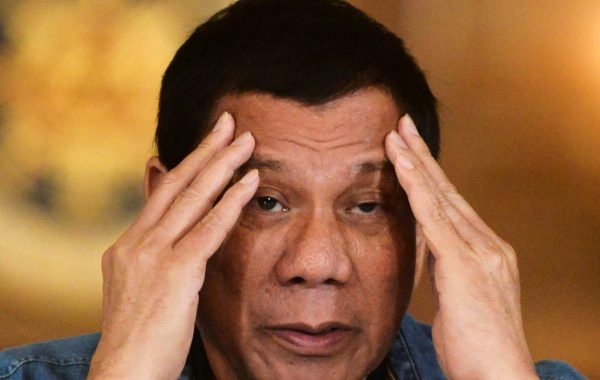Duterte has also been checked by the country’s powerful military who have been anxious about (now failed) peace talks with communists as well as his soft tilt toward China. He only recently and reluctantly threatened to confront Beijing over incursions into the Philippines’ exclusive economic zone in the South China Sea.
Though Duterte did not destroy the country’s democratic institutions, he did significantly weaken them. He jailed opposition Senator Leila de Lima on dubious charges, instigated the removal of an outspoken Supreme Court chief justice, put heavy pressure on critical journalists though court cases and blocked the renewal of broadcasting licenses. And he launched the bloody ‘war on drugs’, which independent observers estimate has killed over ten thousand, largely among urban poor male Filipinos whose lives do not seem to matter.
Yet democratic backsliding has not sapped Duterte’s popularity. Nor has his ‘macho populist’ response to, and obvious mismanagement of, COVID-19. The Philippines is Southeast Asia’s worst performer in per capita cases. New variants are widespread in the current and worst wave to hit the country, amid the largest economic decline in the region. Duterte’s approval ratings recently rose above 90 per cent, leading to claims that he is currently the world’s most popular leader.
By separating popular legitimacy from liberal rights, Duterte has drawn on techniques common to illiberal populists around the world, and added his own violent methods. Yet unlike Donald Trump, Vladimir Putin, or Turkey’s Recep Tayip Erdogan, he has not faced broad-based and sustained pushback. His brute force governance in a weak oligarchic state has won widespread backing across all sectors of Philippine society. This has confined the opposition to the rump of the once powerful Liberal Party, a defensive Catholic Church hierarchy, a small urban intelligentsia and civil society activists. A recent upsurge in extrajudicial killings of legal leftists has drawn condemnation from the United Nations.
This helped Duterte’s power consolidation, but could make sustaining post-presidency Dutertismo more difficult. Duterte’s broad support does not lend itself to the niche, out-of-power movements that follow other populists leaving office in deeply polarised societies, such as Donald Trump, who feeds his followers’ sense of grievance.
Duterte has become a victim of his success. His popularity led to an electoral tsunami in the 2019 midterms, creating an oversized ruling coalition which has exhibited ever larger cracks during the lame duck second half of his presidency. After the elections, a battle royal broke out for the speakership of the House of Representatives, forcing Duterte to broker a tenuous power-sharing arrangement.
Philippine presidents have a poor track record of getting chosen successors elected. The last to manage this feat was Corazon Aquino, whose defence chief Fidel V Ramos squeaked to victory in 1992. Yet there is much at stake for Duterte — he faces potential charges of crimes against humanity before the International Criminal Court and a number of scandals, many involving drugs, of close associates and one of his sons.
These problems make dynastic succession the most promising option to sustain his influence, despite his and his daughter’s denials (it should be recalled Duterte had also initially said he would not run for president in 2016). This is the strategy he used in 2010 when, to avoid mayoral term limits, his daughter Sara Duterte won the mayoral race for the southern city of Davao and Rodrigo became her vice mayor. This is now fuelling rumours he could join his daughter’s ticket as vice presidential candidate. But Sara’s role in the 2019 midterms as head of a new regional party of leading kingpins was far from flawless and made powerful enemies along the way.
It’s a fool’s mission to predict elections over a year in advance, but prognostication is particularly uncertain in the highly personalistic context of Philippine politics where party affiliation is an afterthought. A recent survey put Sara Duterte slightly ahead. But it also points to a regional divide between her (backed by nearly 60 per cent of Mindanao respondents) and Ferdinand ‘Bongbong’ Marcos Jr — the son of the former dictator and the controversial former first lady Imelda Marcos. He has strong support in northern Luzon and eastern Visayas.
That fact that (the separately elected) Vice President Leni Robredo — who has faced withering attacks for daring to stand up to the strongman — polled less than 10 per cent and says she will not run means that there is little chance of a Duterte-critical candidate winning.
Boxing legend and senator Manny Pacquiao, head of Duterte’s nominal party, could also make a claim to his legacy if he ran. Other potential contenders have been non-confrontational — Senator Grace Poe, a former presidential candidate, and the dynamic, youthful mayor of Manila, Isko Moreno, a major dark horse in the race.
This suggests that, despite the record popularity of the Philippine chief executive, Dutertismo may yet be killed by the kindness of supposed supporters.
Mark R Thompson is Professor and Head of Politics at the Department of Asian and International Studies (AIS) and Director of the Southeast Asia Research Centre (SEARC) at the City University of Hong Kong.


Do we really believe the approval ratings of over 90%? There was an anonymous online survey which showed the president’s approval rating closer to 60%. I suspect that is more accurate.